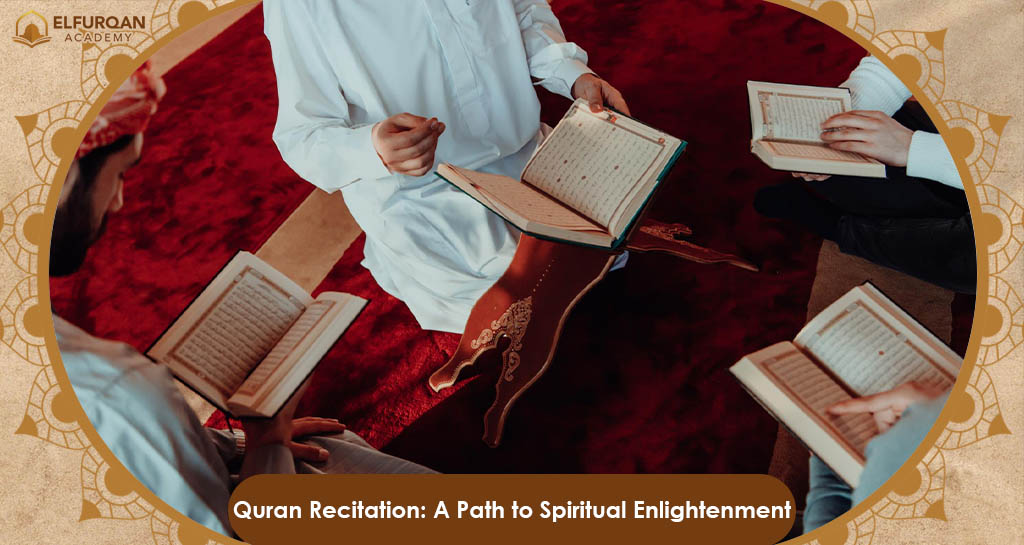Quran Recitation is a sacred practice that connects Muslims to the divine words of Allah, offering spiritual depth, inner peace, and a deeper understanding of faith. More than just reading, it is an act of worship that requires precision, reverence, and reflection. With the growing accessibility of online learning, mastering Quran recitation has become more achievable than ever before.
In this article presented by EL-Furqan Academy, we’ll explore the significance of Quran recitation, the role of Tajweed, and how modern tools and platforms are helping students of all ages enhance their recitation with accuracy and devotion.
Quran Recitation: A Path to Spiritual Enlightenment

Quran recitation is more than just reading sacred text; it is a profound act of worship and reflection. The Holy Quran, regarded as the eternal word of Allah, offers guidance, wisdom, and peace for all who engage with it. Proper recitation not only preserves the integrity of its divine message but also helps the reciter to connect deeply with the spiritual essence of Islam.
Whether you’re a beginner or an experienced reciter, understanding the principles and methods of Quran recitation is essential for a meaningful and rewarding experience. In this article, we explore key tips and practices that can enhance your Quranic recitation and help you get closer to the divine through this sacred act.
EL-Furqan Academy is committed to providing expert guidance and resources for students of all levels to master the art of Quran recitation.
Start Your Quran Learning Journey with EL-Furqan Academy Today!
Ready to deepen your connection with the Quran? At EL-Furqan Academy, we offer expert-led online classes tailored to all ages and levels. Whether you’re looking to improve your Tajweed, memorize the Quran, or build a strong foundation in Islamic studies, our qualified teachers and flexible programs are here to support you every step of the way.
Don’t wait—enroll now and take the first step toward meaningful Quranic learning from the comfort of your home!

Importance of Tajweed
- Correctness of Recitation: Tajweed ensures that the recitation is accurate, preventing any distortions in meaning. Even slight errors in pronunciation can change the meaning of words, so the quran recitation rules of Tajweed help preserve the integrity of the Quran.
- Beautification: The recitation of the Quran with Tajweed beautifies the voice and makes it more pleasant to listen to, which in turn encourages the reciter to engage with the Quran more often.
- Spiritual Rewards: According to a hadith narrated by A’ishah (RA), reciting the Quran beautifully and precisely brings a person closer to the noble angels. Even those who struggle and make mistakes are rewarded twice for their efforts.
Benefits of Tajweed
There are numerous benefits associated with learning and applying Tajweed, including spiritual rewards. The hadith from A’ishah (RA) specifically states:
“One who recites the Quran beautifully, smoothly, and precisely will be in the company of noble angels. As for the one who recites it with difficulty, stammering or stumbling through its verses, (they) will have twice that reward.” [Al-Bukhari]
This highlights that, even for beginners who find it difficult to recite, the effort is valued and rewarded.
Learning Tajweed
It is highly recommended to learn Tajweed from someone who has mastered it. A qualified teacher can guide the student in applying the rules accurately. As it is difficult to hear one’s own mistakes, having a teacher provides invaluable guidance.
However, self-practice is also possible by recording one’s recitation and comparing it with professional reciters, such as Sh. Mahmoud Khalil al-Husary, Mohammed Ayoub, or Mishary Alafasy.
Listening to these reciters helps with pronunciation and the application of Tajweed rules. Many online courses and YouTube videos are available, allowing learners to study Tajweed at their own pace.
Learn also: quran online
Tajweed in recitation Rules
Learning Tajweed requires practice and listening. Below are some of the primary rules:
Ghunnah (Nasal Sound)
This is the nasal sound produced when pronouncing certain letters like م (meem) and ن (noon).
- Example: noon sakinah (نْ) produces a nasal sound. When pronouncing words with tanween, such as بًا (ban), بٍ (bin), and بٌ (boon), the n sound is also nasalized.
Noon Sakinah & Tanween Rules
- Idhaar (To Make Clear): When noon sakinah (نْ) or tanween is followed by specific letters like ء, ه, ع, ح, غ, خ, the noon sound is pronounced clearly, without nasalization.
- Idghaam (To Merge): If noon sakinah or tanween is followed by ي, ن, م, or و, the noon sound merges with the following letter and is pronounced with ghunnah.
- Iqlaab (To Convert): If a ب follows noon sakinah or tanween, the noon sound changes into a م (meem) sound while applying the ghunnah.
- Ikhfaa (To Hide): When noon sakinah or tanween is followed by the remaining letters (ت, ث, ج, د, ذ, etc.), the noon sound is “hidden” while maintaining a slight nasalization.
Meem Sakinah Rules
- The same principles for noon sakinah apply to meem sakinah. For example, if a ب follows a meem sakinah, ghunnah is applied while hiding the meem sound.
- When two meem letters are adjacent, such as مّ, ghunnah is applied and prolonged.
Qalqalah (Echoing)
- This rule involves creating an echoing sound when pronouncing specific letters: ق, ط, ب, ج, and د. This echo occurs when the letter has a sukoon, at the end of an ayah, or when taking a breath.
- Example: When reciting a word like تَجْرِي (tajree), the echo is brief. When stopping on a word ending with a qalqalah letter like اللَّهُ الصَّمَدُ (Allahu As-Samad), the echo is more pronounced.
Madd (Elongation)
- Madd involves extending the sound of certain letters, namely ا, و, and ى.
- Two-beat Madd: When a Madd letter is followed by a letter without a hamzah or sukoon, the sound is prolonged for two beats.
- Flexible Madd: If one stops at a word with a Madd before the last letter, the elongation can range from two to six beats.
- Four-beat Madd: When a Madd letter is followed by a hamzah, the elongation is prolonged for four or five beats.
- Six-beat Madd: When a letter with a shaddah follows a Madd letter, or if a Madd letter is followed by a sukoon, the elongation should be for six beats.
Learn more: noorani qaida lesson in english
The Power of ‘Bismillahir Rahmanir Rahim
If we were to attempt to fully outline the benefits of reciting the phrase “Bismillah…” (In the name of Allah, the Most Gracious, the Most Merciful), we would need more than a single volume to adequately capture its significance.
This verse is not only a part of every chapter in the Qur’an, except for Surah At-Tawba (Chapter of Repentance), but it is also the most frequently repeated verse throughout the entire Holy Qur’an.
It is narrated in Tafsir al-Burhan that the Holy Prophet (S) said: “When a person recites ‘Bismillah…’, five thousand ruby palaces are built for him in Jannah. Each palace contains a thousand chambers made of pearls, and each chamber holds seventy thousand emerald thrones. Each throne has seventy thousand carpets made of fine fabrics, upon which sits a Hur-ul-Ayn (the heavenly maidens).”
Upon being asked what condition was necessary to receive such a reward, the Prophet (S) replied that the person should recite “Bismillah…” with deep conviction and understanding.
The Prophet (S) also said: “On the Day of Judgment, when a believer has to cross the Pul-e-Siraat (the bridge over Hell), if he recites ‘Bismillah…’, the flames beneath him will start to subside. Eventually, Jahannam (Hell) will cry out, ‘O believer, pass through quickly, for your presence is causing my fire to fade!'”
Furthermore, when a teacher teaches a child to recite “Bismillah…”, the child, along with his parents and the teacher, are all guaranteed protection from the torment of Hell.
There is a narration of Prophet Isa (A.S.) passing by a graveyard where he saw a grave upon which the Wrath and Punishment of Allah (S.W.T.) were descending. He quietly passed by.
However, when he returned later, he noticed that the Mercy and Blessings of Allah (S.W.T.) were descending upon the same grave. Prophet Isa (A.S.) was astonished and asked Allah (S.W.T.) about the change. Allah (S.W.T.) revealed to him that the man in the grave had been a sinner and was being punished for his actions. However, when he died, his wife was pregnant, and soon after, she gave birth to a son.
As the boy grew older, his mother took him to a teacher who taught him to recite “Bismillah…”. Allah (S.W.T.) said, “It would not be just for the son of this man to call My Name while his father is being punished. Therefore, I have decided to show mercy on him.”
It is also mentioned that reciting “Bismillah…” loudly is a sign of a true believer. Imam Ali Ridha (A.S.) said that “Bismillah…” is very close to the chosen Name of Allah (S.W.T.) [Isma A’dham], the greatest name of Allah.
Read also: quran reading
Quran Recitation Tips

Quran recitation is not just an act of reading; it is a sacred practice that requires sincerity, mindfulness, and dedication. To recite the Quran effectively, start by ensuring you are in a clean state, both physically and mentally. Performing Wudu (ablution) is highly recommended before beginning. Choose a quiet, distraction-free environment so you can fully concentrate on the words of Allah.
One of the most important aspects of Quran recitation is adhering to the rules of Tajweed, which help preserve the correct pronunciation and tone. It’s also beneficial to listen to skilled reciters, like Sheikh Sudais or Sheikh Shuraim, to help guide your recitation. Recite with a clear understanding of the meanings of the verses; this will enhance your connection and reflection upon the message.
Additionally, reciting slowly and with calmness allows you to focus on the beauty of the words, ensuring that each verse is pronounced with care. Finally, always begin with “Bismillah” (In the Name of Allah) before each recitation, and remember that the Quran is a divine guidance, meant to nurture and shape the soul.
In conclusion, Quran recitation is a powerful tool for spiritual growth, fostering a deep connection with Allah and providing tranquility for the soul. By following the proper techniques, understanding Tajweed, and reciting with sincerity, we can not only preserve the purity of the Quran’s message but also draw closer to its divine wisdom.
Regular recitation nurtures inner peace, strengthens faith, and inspires personal reflection. As we embark on this sacred journey, may we approach Quran recitation with reverence, mindfulness, and a desire to grow spiritually.
